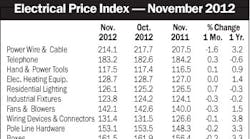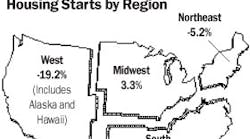Electrical manufacturers are being forced to increase prices by at least 5 percent to 10 percent on steel products.
Industry observers say contributing factors include rising raw material costs, a weak U.S. dollar and other global factors.
According to several sources, the cost of iron ore is up 65 percent and scrap steel has gone up 36 percent over the past three months. Just four months ago, steel prices were $500 a ton, and now the price for hot-rolled steel has hit $800-plus a ton.
“Steel prices in general have exploded in the last two months,” said John Anton, director of Global Insight Steel Service, Waltham, Mass. “They are up about 50 percent since December, and while they should have increased, 50 percent is a bit on the ridiculous side.”
Anton said electrical steel has been under pressure because of the building of electrical infrastructure in the United States, rebuilding after Katrina and demand in China and India.
“Things will improve, but for right now, it’s definitely a seller’s market,” Anton said.
The number one issue probably is rising raw material costs, said David Burnette, national sales manager, Electrical Division, Wheatland Tube, Swarthmore, Pa. “Certainly, a big part of what is driving all of this is the weak U.S. dollar. The dollar is so cheap, you have scrap steel prices as high or higher than what we were paying for finished hot-rolled steel four months ago. In the last three weeks, the iron ore miners have successfully negotiated a 65-percent increase with the major steel mills around the world. Coke and coal is rising 40 percent to 50 percent, scrap steel prices have skyrocketed, and U.S. scrap steel is flowing offshore to countries like Turkey, which are buying up the scrap steel.”
Don Brody, vice president of sales, Hubbell Electrical Products, agrees that many global factors have contributed to the need to increase steel prices. “We certainly didn’t anticipate the last round of increases that we got, and we had no choice,” said Brody. Hubbell is implementing price increases effective April 1.
“We’ve had price increases on a weekly or biweekly basis recently,” said Wheatland Tube’s Burnette. “What Wheatland Tube is trying to accomplish is announcing small, reasonable increases without notice so distributors don’t feel compelled to make decisions about whether or not to load up.”
Burnette is telling his distributors they need to do two things. They need to plan their business assuming extended lead times for their steel conduit deliveries going into the spring and summer and have a plan in place so that if disruptions occur, they can manage their sales forces. In 2004, when conduit went on allocation, some distributors’ salespeople didn’t really understand what was going on, he said.

